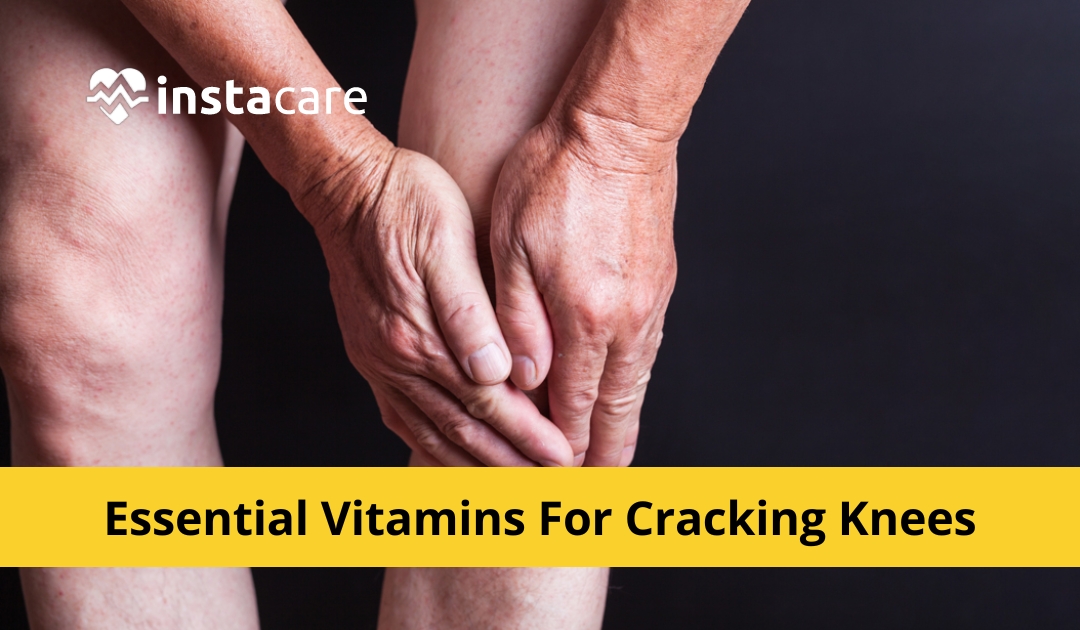Vitamins to Treat Cracked Knees? Cracking knees or joints
may indicate a vitamin deficiency, leading to disease if not treated promptly.
There are several vitamins for broken knees on the market. Which, however, is
the most effective?
This health blog discusses some of the best vitamins for cracking knees and the possible causes.
Concerning Knee Cracks
Knee crepitus is another term for knee cracking. According to the study, "knee crepitus is very common, with 99% of the knee making physiological sounds." The inside of the knee joint is covered with cartilage, similar to that of chicken bones. This cartilage protects the joint when we bend, flex, and extend the knee.
When this cartilage wears down or breaks down, bending the knee can become rough and produce a cracking sound. When the cartilage is severely damaged, it causes painful stretching and severe swelling.
What Are The Symptoms Of Cracked Knees?
Although little research has been conducted on knee cracks, recent studies have revealed that most knee cracks are natural and not harmful. Your knee could blow up for the following reasons:
Knee Ligament Damage
Sports injuries, for example, can result in knee ligament
injuries. The anterior cruciate ligament (ACL) also is one of the most injured
ligaments. One of the telltale signs of an anterior cruciate ligament (ACL)
injury in the knee is a loud clicking sound usually accompanied by sharp pain.
The presence of petrol bubbles in the knee can also result in popping or
rupture. This is generally fine.
Gas can accumulate in the tissues surrounding the joint over time, causing tiny bubbles to form in the synovial fluid. When you bend your knees, blisters appear.
Arthritis
Osteoarthritis, also known as "wear-and-tear" arthritis, frequently affects the joints used the most and is subjected to the most stress, such as the knees.
Injuries
Trauma can also cause knee fractures. You can injure your
patella or other parts of your knee joint if you fall on your knees.
The following are also some of the most common types of injuries that can result in a stiff knee:
- Meniscus tears
- Chondromalacia patella
- Patellofemoral syndrome
Vitamins For Cracked Knees
The following are some of the best vitamins for cracking knees:
1- Fatty Acids Omega 3
Anti-inflammatory omega-3 fatty acids are commonly used in joint supplements to treat joint health, particularly knees and arthritis. Three omega-3 fatty acids are alpha-linolenic acid (ALA), docosahexaenoic acid (DHA), and eicosapentaenoic acid (EPA) (EPA). According to research, they can effectively treat knee problems.
A 2006 study on omega-3 fatty acids states, "fish oil supplementation with essential omega-3 fatty acids appears to be a safe alternative to NSAIDs for the nonsurgical treatment of neck or back pain."
2- Vitamin E
Evidence suggests that vitamin E supplementation may protect against oxidative stress-mediated biomolecule degradation in osteoarthritis.
The most common rheumatic disease and the leading cause of permanent disability in the elderly is osteoarthritis. Because it is an antioxidant, vitamin E has been shown to reduce pain and inflammation also associated with arthritis.
View More: 10 Home Remedies To Get Rid Of Dark Knees And Elbows
3- Curcumin
Turmeric is a spice used in Pakistani cooking. It is a
functional food due to the chemical component curcumin. Curcumin, according to
studies, has an anti-inflammatory effect and effectively reduces the symptoms
of knee arthritis.
Because curcumin only accounts for 3% to 5% of turmeric, supplementation may be the most effective way to obtain the anti-inflammatory effects of this chemical.
4- Glucosamine
Glucosamine is in charge of cartilage, the main structural component of joints. To put it another way, it will strengthen your joints and improve your mobility. It is required for joint connective tissue formation, maintenance, and normal condition. As a result, glucosamine supplements may be one of the most effective vitamins for cracked knees.
5- B12 vitamin
Low vitamin B12 levels can mimic arthritis symptoms such as fatigue, pain, or limb tingling. It also helps to regulate homocysteine levels, which are elevated in rheumatoid arthritis patients.
6- Vitamin D
This vitamin is necessary for bone tissue and joint health.
It is involved in calcium absorption because your body requires vitamin D to utilize
this mineral. Vitamin D may also have anti-inflammatory properties, lending
credence to its ability to alleviate joint pain.
It is critical to check the vitamin D levels in your blood because a lack of this vitamin has been linked to an increased risk of joint pain and autoimmune disease such as rheumatoid arthritis.
Bottom Line
Cracked knees and joints can indicate several dangerous conditions that, if left untreated, can worsen. Supplements can help, but only after consulting with a doctor. Orthopedic doctors are experts who treat all bone-related conditions. They can advise you on the best treatment for cracked knees and recommend adequate vitamins.
Please book an appointment with the best Dermatologist in Lahore, Karachi, Islamabad, and all major cities of Pakistan through InstaCare, or call our helpline at 03171777509 to find a verified doctor for your disease.
Source: https://instacare.pk/blog/vitamins-for-cracking-knees

